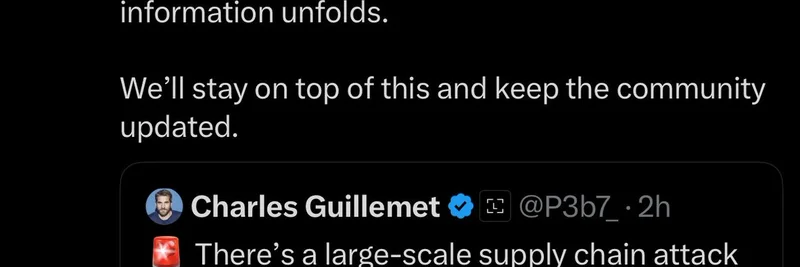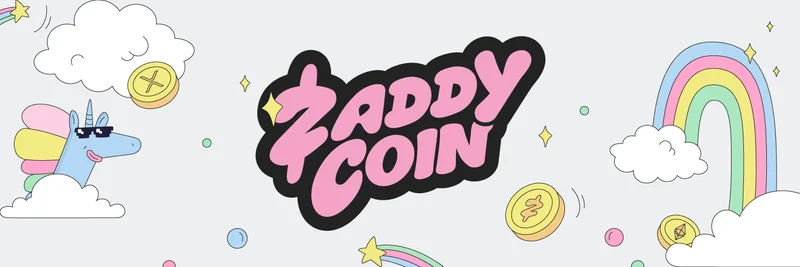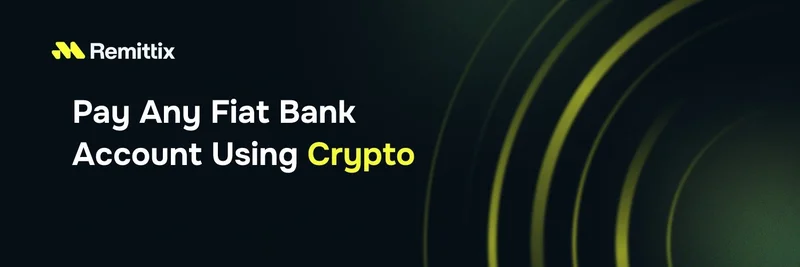Hey folks, if you're deep into the Solana ecosystem—whether you're staking your SOL or trading those hot meme tokens like BONK or WIF—you know how crucial security is. Today, we're diving into a big alert that's got the crypto world buzzing: a massive supply chain attack on NPM, the go-to package manager for JavaScript developers. Solana's leading staking platform, Marinade Finance, just dropped an update reassuring users, but urging everyone to keep their guards up. This all stems from a tweet thread highlighted by @SolanaFloor, so let's break it down step by step.
The Spark: Ledger CTO Sounds the Alarm
It all kicked off with an urgent post from Charles Guillemet, the CTO of hardware wallet giant Ledger, on September 8, 2025. In his X post, Charles warned about a "large-scale supply chain attack in progress." Here's the gist: a reputable developer's NPM account got hacked, and malicious code was injected into popular packages that have racked up over 1 billion downloads. That's not a typo—1 billion times these tainted packages have been pulled into projects worldwide.
For those new to this, NPM (Node Package Manager) is like the app store for JavaScript code. Developers use it to grab pre-built tools to speed up building apps, including decentralized apps (dApps) on blockchains like Solana. A supply chain attack means the bad guys compromised the source, so anyone downloading those packages could unknowingly install malware. In this case, the sneaky payload targets crypto users by swapping wallet addresses in transactions—imagine sending your meme token gains to a friend, but they end up in the hacker's pocket instead.
Charles linked to a detailed report from Aikido Security, which revealed the culprits: ultra-popular packages like debug (over 357 million weekly downloads) and chalk (nearly 300 million). These aren't obscure tools; they're staples in Node.js projects, including those building Solana wallets and interfaces. The malware hooks into browser functions, intercepts transactions across chains like Ethereum, Bitcoin, and yes, Solana, and rewrites addresses to siphon funds. It even alters approvals and allowances to make the theft seamless, all while staying hidden from basic checks.
Marinade Finance Steps Up: No Impact, But Vigilance Required
Enter Marinade Finance, Solana's powerhouse for liquid staking. They're all about optimizing your SOL stakes across top-performing validators, which is a game-changer for anyone holding meme tokens or just HODLing. In their official response quoting Charles's post, the team shared: "We are monitoring the ongoing NPM supply chain attack. After double-checking our systems, Marinade is not affected. Still, we advise everyone to stay vigilant as the situation unfolds. We’ll continue to track this closely and keep the community updated."
This is huge reassurance for Solana stakers. Marinade's quick investigation means their platform and users' funds are safe from this specific breach. But as they wisely point out, the broader JavaScript ecosystem is still at risk, and since many Solana tools rely on these packages, it's smart to err on the side of caution.
The update was amplified by @SolanaFloor, Solana's go-to news hub, in their tweet: "UPDATE: Solana’s top staking protocol @MarinadeFinance says it is monitoring the ongoing NPM supply chain attack. Based on its initial investigation, Marinade is not affected but advises users to remain vigilant as more information emerges."
Why This Matters for Meme Token Traders and Solana Enthusiasts
Solana's fast, low-cost network is a paradise for meme coins, but it's also a target for sophisticated attacks like this. If you're using dApps, wallets, or trading bots built with JavaScript (which is most of them), this could indirectly hit your setup. The malware's focus on crypto address swapping is particularly nasty for on-chain activities—think swapping tokens on Jupiter or staking via Marinade. Even if your wallet app isn't directly compromised, a tainted dependency in a web interface could lead to drained funds.
The scale is mind-blowing: these packages see billions of weekly downloads, per Aikido's analysis. The attack rolled out on September 8 around 13:16 UTC, and by the time alerts went out, the damage potential was enormous. While the maintainer was notified and started cleanup, not everyone updates instantly, so lingering risks remain.
Staying Safe: Actionable Tips for Crypto Users
Don't panic, but do act. Here's some straightforward advice drawn from Charles Guillemet and security experts:
- Use Hardware Wallets: If you haven't already, grab a Ledger or similar with a secure screen. Always double-check transaction details before signing—look for "Clear Signing" support to verify addresses aren't swapped.
- Avoid Blind Signing: Never approve transactions without reviewing every detail. If it looks off, cancel.
- Update Everything: Check your dApps, wallets, and browsers for updates. Avoid using software wallets for now if possible, as the report notes uncertainty around seed phrase theft.
- Monitor Your Accounts: Keep an eye on your Solana wallet via explorers like Solscan. If you're staking with Marinade, their team is on it, but enable all security features.
- For Developers: Audit your dependencies. Tools like npm audit or Aikido can flag issues. Steer clear of the affected packages until verified clean.
Marinade's proactive stance is a reminder of why trusted protocols like theirs are essential in the wild world of blockchain. As the situation evolves, we'll keep you posted here at Meme Insider—because staying informed is the best defense in meme token trading and beyond.
If you've got thoughts on this attack or how it ties into Solana's meme scene, drop a comment below. Stay safe out there, degens!




